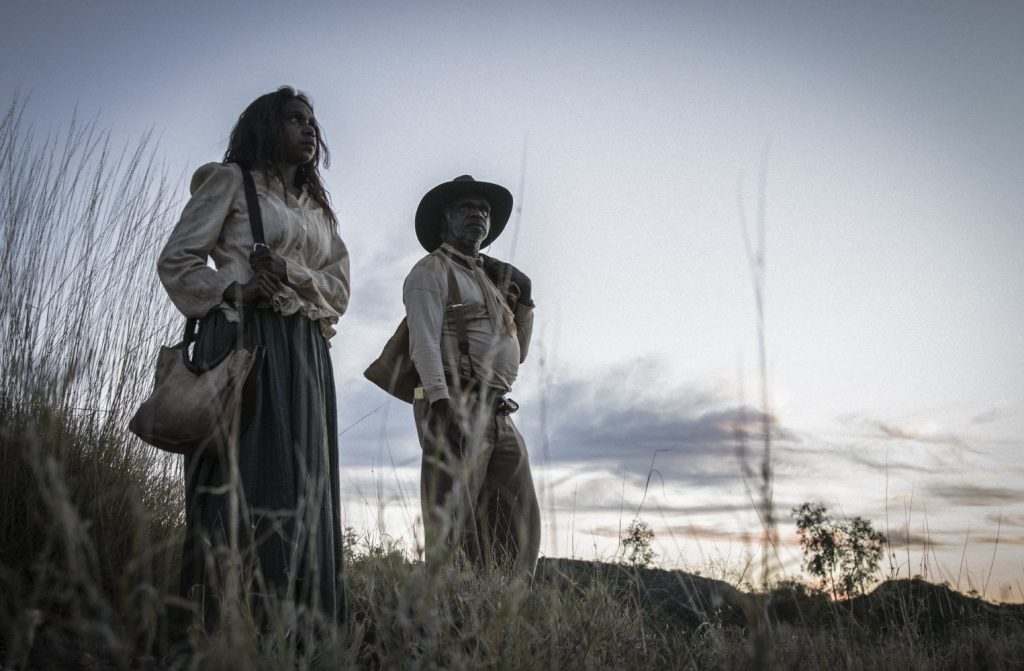Reviewed by Lee Hill
Sweet Country is a sympathetic, but unsentimental look at one of many turning points in the tortured relations between aboriginal peoples and white Australians. Set in 1929, Mick, an embittered and alcoholic war veteran (Thomas M. Wright) buys a station in a remote part of New South Wales. With little farming know-how, he enlists the aid of Fred Smith, his closest neighbour (Sam Neill), a born-again Christian who has renounced violence and treats an aboriginal family led by Sam Kelly (Hamilton Morris) living on his land as equals rather than near slaves which is the social norm. When Fred reluctantly asks Sam Kelly (Hamilton Morris) to do a day’s work for Mick, this gesture of good will sets off a tragic chain of events. The day has barely passed when Kelly is forced to shoot and kill Mick and escape into the outback with his wife.
From this point forward, Sweet Country’s hypnotic narrative is driven by a foolhardy manhunt led by Sergeant Fletcher (Bryan Brown), the lone constable of the nearest town, and the subsequent trial of Sam, presided over by Judge Taylor (Matt Day). The manhunt and trial are tinged with irony as they reveal how legal systems and the justice they should provide all too often move one step forward and then two steps back.
On paper, this socially conscious neo-Western recalls such celebrated Australian films as The Chant of Jimmie Blacksmith, Rabbit Proof-Fence, The Proposition and Mad Dog Morgan, but Warwick Thornton and his writers, David Tranter and Steven Macgregor, make cunning use of ellipses and flash forwards and flashbacks to make us reassess our initial assessment of the situation. It is a storytelling approach that not only recalls the work of fellow countryman Peter Weir, but also the time and memory twisting narratives of Nicolas Roeg, Alain Resnais and Steven Soderbergh at their best. Acting as his own director of photography, Thornton not only conveys the beauty of the rural landscape in which his characters live, but its cruel indifference to their hopes and delusions.
Although Sweet Country is thematically rich precisely because of director Thornton’s aboriginal background (he came to international attention when he won the Camera D’Or at Cannes for his 2009 debut, Samson and Delilah), this film never feels like a polemic. Yes, most of the white characters are racist and sexist by turns, but their angry and confused expressions also hint at a growing awareness that times are changing and that reluctantly they must change too. Similarly, the aboriginal characters are shown as subtly jockeying for position in the cramped hierarchy they have carved out with the whites who have taken over their homeland. Unsurprisingly the women – both aboriginal and white – are the ones who are revealed to be the most adaptable as progress moves haltingly forward.
Sweet Country deserves to take its place along with the worthy titles mentioned earlier. Thornton has created a haunting mix of revisionist Western, historical allegory and political commentary. The images and performances in Sweet Country resonate long after the credits roll along with the disturbing sense that the world at large, as well as Australia, still has a long way to go before true liberty, equality and fraternity come into deep focus.
Director: Warwick Thornton
Writers: Steven McGregor, David Tranter
Stars: Bryan Brown, Matt Day, Tremayne Doolan
Sweet Country is in cinemas from Friday 9th of March.
